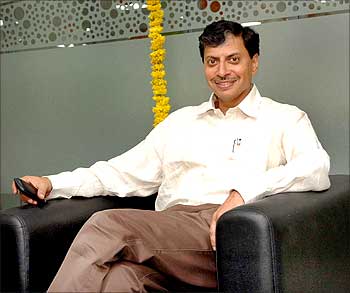
The world economy has started showing signs of recovery but it will be slow says Phaneesh Murthy, Chief Executive Officer, iGate Corporation.
"More countries will emerge with power and influence. China and Russia will have bigger voices. Though India is far, far behind China, over the next 10 years, India will also emerge as an economic power," says Murthy.
Murthy took over as the CEO, iGate Corporation in 2003. Today, iGate has revenues to the tune of $200 million and employs 6,500 people. It has facilities in Bangalore, Chennai, Hyderabad, Noida, Mexico and Ballart in Australia.
Murthy talks about the world economy, recession and recovery in an interview with Contributing Managing Editor Shobha Warrier.
Last year in November when we spoke, you said, it was all gloom and doom in Silicon Valley. We hear that a slow recovery has started in the US. Has the recovery begun?
From April last year, I have been talking about a recovery this July (2009). Everyone said then that I was too pessimistic. In November last year, when I said the same, they said I was too optimistic. Yes, we are starting to see the recovery. But I think it is going to be a slow recovery.
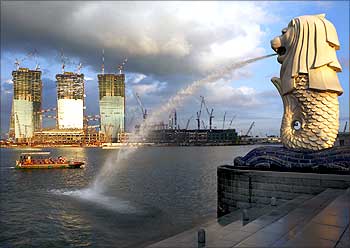
Why do you feel the recovery will be slow?
There are big challenges. The banking industry has still not come to terms with commercial real estate, and credit card defaults. As unemployment goes up, there will be more mortgage defaults. We are in a situation where we will see a lot more unemployment, more banking charges.
It is estimated that another trillion dollars of banking charges will have to be spent.
The banking sector is still going through its crisis. Too many battles are being fought by the US government at the same time.
Money is being pumped into the banking and healthcare sectors. I don't know what will be the implication of all this. So, I believe it is going to be a very slow recovery.
Singapore, France and some other countries grew in the last quarter. Will this in any way help the US economy's growth?
It is now clearly a global economy and all markets are closely tied together and highly co-related. Countries like China and India did not go into recession but they are in a low growth phase.
The US remains the largest consumer market globally and it will remain so, notwithstanding the fact that China and India have large populations and are high growth markets. But in overall dollar terms, US will continue to remain the largest market for some time to come.

Recently, both the UK and US started a drive to phase out old cars by giving incentives to consumers to buy new cars. Has this anything to do with the slow recovery?
I don't think only this triggered recovery. They have tried multiple things and everyone panicked as a result of the recession. There have been lot of initiatives in many areas and the stimulus packages have also contributed to the recovery.
For the first time in the US, savings have started going up. Multiple factors are actually contributing to the recovery. Recent corporate reports have also helped the stock exchanges.
Even if you really don't have the money, the perception that you may have the money creates a positive atmosphere.
In China, initiatives worked a little faster than the US because they have chosen the priority sectors like electric cars, battery technology, etc. It is interesting to see how these countries are doing it differently.
How is the mood in the US?
May be some smiles! We are anticipating unemployment to go up above 10.5-11 per cent. More and more people are losing jobs every quarter. About 500,000 people are losing jobs every quarter.
Unless unemployment bottoms out, and people start getting hired again, it is going to be difficult for the smiles to come back.
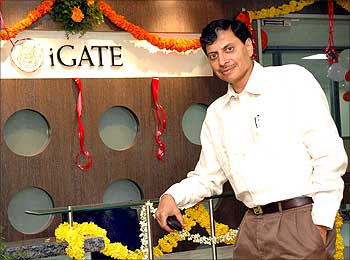
I am a supporter of free markets. So I don't agree with many of the current US policies -- some of which are socialist measures -- like closing of the borders, and trying to generate employment at the cost of others outside the country.
The US is known as one of the most entrepreneurial and risk-taking nation. And that attitude has generated super normal returns. Now you cannot shut the stable doors. Horses have bolted long back.
Most of the banks are now in a desperate hurry to return the TARP (Troubled Asset Relief Programme) money. Last year, when all of these banks took the money, they all thought it was soft, easy money. Now, they are finding painful to be part of the so called nationalised set up, where every bonus and even expenditure is up for public scrutiny.
I have never believed in nationalisation. I find it difficult to believe that the government can do a good job running banks when it finds providing basic services difficult. They have enough problems to be solved.
How do you react to the argument that India did not get affected that badly by the global recession because of the Left? The Left also said many times that the country has to thank them for saving it.
If you can live on an island, you will be very safe if something happens on the main land. But at the same time, I would argue that from 1991 to 2009, India has seen 18 years of phenomenal growth and genuine wealth creation. There was huge surge in middle-class income. All of this was because India got integrated into the global economy. It is not because India has remained an island.
You have global products and services at good prices. So you have options. It has created a little bit of a consumer movement. At the same time, Indian products and services have made their way into the world.
India has to be a part of that world and I don't accept the Left's view of a closed nation. We are a country of 1.1 billion people. I find it very difficult to imagine us creating jobs within our country. So we have to figure out a way to create employment for these 1.1 billion people by which they serve the world. This cannot be done by remaining isolated from the world.
You have to remain integrated with the world economy and bear the costs and pains, and also enjoy the fruits.
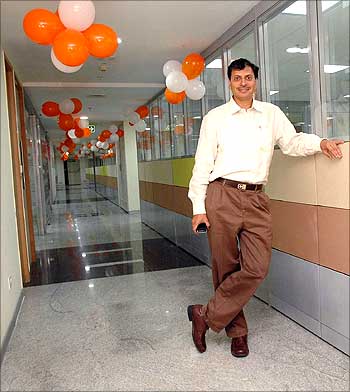
The entire world suffered because of the economic crisis in the US. Is this over dependence on a single country good?
US fundamentally is still the largest market for products and services. But one thing is sure, US's economic power and influence on world policies will change now.
But as long as the US remains the world's largest market, it will wield a certain type of economic power, which nobody else can command. It will take 30-40 years for China or India to become the largest market in the world. So, in the next few years, the US will remain the largest economic power.
Which sectors do you think will drive the recovery?
Multiple sectors will drive the recovery. With the amount of investments in health care, pharma will see strong growth. Financial services has bottomed out so much that it could also see some growth.
From a services perspective, I believe it will be a business process putsourcing and infrastructure management services driven growth.
If you look at a typical budget, 17-19 per cent of their application development and maintenance dollars are being spent offshore in India. This could go up to 30 per cent.
Future growth will be largely BPO driven. Some of it will end up in captives and some in third party management.
As far as employment in India is concerned, it is great news. From the firms' point of view, we will have to see how much of it will be captive, and how much will be third party.
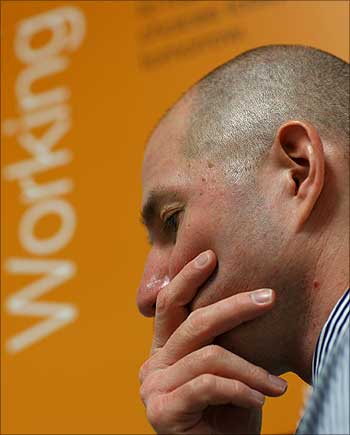
I think the IT sector has lost 4 to 6 quarters of growth. This is what I call a tick mark recovery. You lose in one quarter rapidly and to gain back that level, it takes 4 to 6 quarters. I think it is quite bad.
In 2009, the sector will be a net generator of employment of only 5-10 per cent of what it was in the previous year. And that is a frightening statistic. The last few years have seen students coming out of colleges getting into IT firms. The fact that nobody was hiring created a little bit of a challenge.
Will companies start hiring now?
Yes, they will start hiring now. However, everyone has become a little more wary. All the companies had marginal growth compared to the previous quarter.
Growth for the quarter ending June was negative to 4.5 per cent (iGate ended up being one of the best with 4.5 per cent growth) but all the companies had a big impact on their bottom line.
We will start adding people, but the additions will be little more conservative. However, it will be more in the lines of 'just-in-time' hiring than investment hiring. Companies will need more skilled people.
If you look at the market also, customers are looking for more value. To get more value, you have to compete a lot harder. Therefore, employers are looking for more value from employees and potential employees. Salaries will remain flat for the freshers.
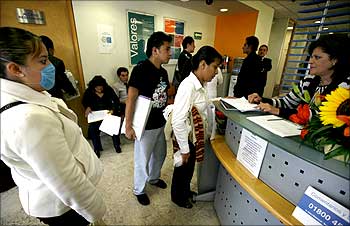
With the US on recovery path, do you think more outsourcing will happen?
Yes, it will happen. In the US also, people are nervous about fixed costs and will end up doing more outsourcing. The headwinds are Obama's comments. Otherwise, one can expect a recovery in the outsourcing industry.
There is an interesting debate. I am in a council of CEOs in the Silicon Valley. They believe that all Indian and Chinese students who come to study in the US should be automatically given the green card!
One argument is that they should stay back in the US because they can contribute to the US. You have to figure what the administration will do regarding the immigration issue. It is only less than a year away.

Which are the most attractive outsourcing destinations?
India. In the last two years, the country has actually gained popularity. Everyone looked at Vietnam, Latin America, China, Mexico, Costa Rica, Baltic States and Eastern Europe.
After having visited all these places, companies have come to the conclusion that India is still the place to be, for value for money, capability, competence, maturity, experience, quick start and cost perspectives.

We have been suffering from 2007 because of the mortgage meltdown (where we had 11 per cent exposure at the peak). We have a 55 per cent exposure in the financial services space.
Having been through some really difficult times, we had one of the best quarters from margin perspective. We had a 38.2 per cent gross margin and 15 per cent operating margin. Our goal of 40:20 (gross margin: operating margin) is looking good. Last quarter we grew 4.5 per cent. The July-September quarter looks comfortable to achieve similar kind of growth.
If we can do all of that in bad times, I think we stand in good stead.
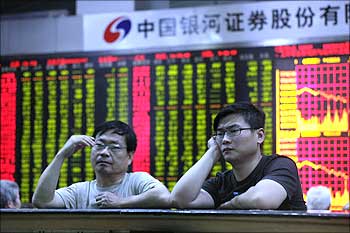
The Eastern influence will increase. China is not only becoming more vocal, people are looking for cues from China. They are certainly wielding a lot of economic influence and people are looking for signals from them as they are the largest holders of US Treasury bonds.
More countries will emerge with power and influence. China and Russia will have bigger voices. Though India is far, far behind China, over the next 10 years, India will also emerge as an economic power.
What are the lessons to be learnt from the recession?
The first big lesson is that operating with lean cost structures is a competitive edge. Bulk of General & Administration (G&A) expense for US companies is in the US where as for Indian companies, it is in India.
The second lesson, for me at least, is, however large a particular industry is, multiple verticals are a must.
The third point that I noticed from the recession is that US executives start responding after two to three quarters into a recession. They don't get to make decisions immediately before or just into the recession.